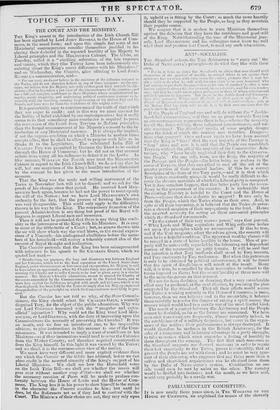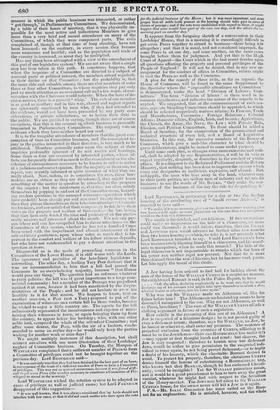PARLIAMENTARY COMMITTEES.
Ir is now nearly three years since, in THE WORKING OF THE HOUSE OF COMMONS, we explained the causes of the slovenly • manner in which the public business was transacted, or rather " got through," in Parliamentary Committees. We demonstrated,
by a table of their hours of meeting, that it was physically jim
possible for the most active and industrious Members to give more than a very brief and casual attendance on many of the Committees, of which they were component parts. The evils complained of, though at that time of long standing, have not been lessened : on the contrary, in every session they become mow numerous and hurtful; and as the population and trade of the country is increased, so must they be multiplied. Has any thing been attempted with a view to the amendment of this part of our legislative system ? We are not aware that a single step has been taken in this path. It sometimes happens, that when the inquiries of a Committee are directed to a subject of unusual party or political interest, the members attend regularly to their duties on that Committee ; but the probability is, that the more able and valuable among them are also members of some three or four other Committees, to whose inquiries they pay only Just as much attention as an occasional call and a few words of con- versation with the Chairman would indicate. When the hour of de-
cision arrives, there is a general " whip." The vote of one member is as good as another; and in this way, absurd and unjust reports
are ignorantly sanctioned by men who, if they had attended to the evidence, would not have been persuaded by any party con- siderations, or private solicitations, so to betray their duty to
the public. We are justified in saying, though there are of course exceptions, that this is the manner inewhich business is generally transacted in Parliamentary Committees. The majority vote on evidence which they have neither beard nor read.
It is to the irregular attendance of members that the great con- sumption of time on Committee business, and the consequent in-
jury to the parties interested in their dccisione, is very much to be attributed. Members generally enter upon the subject of their inquiries profoundly ignorant of its real merits and bearings. Some three or four are crammed by interested parties, whose ef- forts are frequently directed as much to the concealment as the elu- cidation of circumstances necessary to he known in order to arrive at a judicious and correct opinion. But the majority of them are, we repeat, very scantily informed or quite ignorant of what they are really about. Now, unless, as is sometimes the case, these law- makers arc as obtuse as they are ill-in1ormc:1, they /night learn something of the matter in question by attending to the progress of the inquiry : but the misfortune is, that they too often satisfy themselves by popping in and out of the Committee-room, hazard- ing random questions to the annoyed witnesses—questions which have probably been already put and answered twenty times ; and then they plume themselves on their laborious attention to Commit- tee business, and are satisfied of their compel:Nal' to deelde by their votes on the property and welfare of thousands,—the fact being, that they have only wasted the time and patience of all the parties really anxious and interested about the result. We ask any per- son whose evil star has compelled him to dance attendance on the Committees of this session, whether he has not a hundred limes been vexed with the, impertinent and absurd interference of the self-sufficient gentlemen, upon whose votes so much that is im- portant to the comfort and welfare of his fellow citizens depends, but who have not condescended to pay a decent attention to the question at issue.
Disgraceful as is the mode of proceeding common in the Committees of the Lower House, it is still worse with the Lords. The ignorance and prejudice of the hereditary legislators is astounding. The other day, a leading Tory Peer declared that it was no recommendation to him that a bill had passed the Commons by an overwhelming majority, because "that House would pass any thing." The question had no reference whatever to party politics: the bill was of great importance to a large com- mercial community; but a member of the Peerage was prejudiced against it at once, because it had been sanctioned by the Repre- sentatives of the People ; and he did not hesitate to avew his hostility to it for that reason. We happen to know, that on another occasion, a Peer (not a Tory) proposed to put off the examination of witnesses on a certain bill for three weeks, because be wished to enjoy a little country air. The agents for the bill submissively represented the inconvenience and expense of main- taining their witnesses in town, or again bringing them up from the country, to appear before his lordship; who, with one other noble lord, composed the whole of the attendant Committee; and after some demur, the Peer, with the air of a bashaw, conde- scended to name an earlier day—lie would only keep the parties waiting for another week or nine days !
We might multiply instances of this description, but shall content ourselves with one more illustration of their Lordships' neglect of Committee business. On Tuesday, the Marquis of WESTMEATH complained theta sufficient number of Peers to form a Committee of privileges could not be brought together on the previous day. Lord BROUGHAM said— "It was certainly true that they had been detained for the best part of an hour, inconsequence of the want of a sufficient number of Peers to form a Committee of privileges. This was not an unusual occurrence, because it was found tirlfi- cult to get seem Peers (the number necessary to constitute a Committee of Pri- vileges) to attend in the morning."
Lord WESTMEATH wished the rotation system to be adopted in eases of privilege as well as judicial cases; but Lord FARNHAM disapproved of this suggestion- " It was well known, that it was always considered that lay lords should not Interfere with law cases, so that it did not much matter who were upon time rota for the judicial business of time House ; but it was most important and most proper that all noble lords present at the hearing should take part in cases of claims of peerage; and if the rota were established with regard to them, it might happen that some would hear part of the case one day, tad the others the re- maining part on another day."
It appears from the foregoing sketch of a conversation in their Lordships' House, that in a morning it is exceedingly difficult to get seven Peers together to attend to business—there being 430 altogether ; and that it is usual, and not considered improper, for some Peers to sit one day, and some another, on the same eases brought before them for judgment. And yet this is the High Court of Appeal—the Court which in the last resort decides upon all questions affecting the property and personal privileges of the People of England ! It will not be denied, that in any new ar- rangement for the conduct of affairs in Committee, reform ought to visit the Peers as well as the Commons.
A plan for the remedy of these evils, so far as regards the House of Commons, will be found in the same Supplement to the Spectator where the "impossible attendance on Committees " is demonstrated, under the head "Division of Labour; Com- mittees." The term "division of labour " is there used in its common signification, and indicates the nature of the remedy to be applied. We suggested, that at the commencement of each ses- sion, sepesate Standing Committees should be appointed, to which should be referred respectively matters relating to Finance, Trade and Manufactures, Commerce ; Foreign Relations ; Colonial Affairs ; Domestic affiiirs, English, Irish, and Scotch ; Agriculture, the Church, the Army, the Navy, the Law ; with Private Bills, Election, and Petition Committees. To these should be added a Board of Scrutiny, for the examination of the grammatical and technical structure of every bill, and a Board of Legislative Statistics. In this way, the excessive numbers of the House of Commons, which give a mob-like character to what should be grave deliberations, might be turned to some useful purpose.
Until some such plan, or changes even more extensive and radi- cal, shall be adopted by our Representatives, it will be in vain to expect regularity, despatch, or discretion in the conduct of public affairs. It is a disgrace to the Reformed Parliament and the Reform Ministry, that nothing has been done to improve the system which every one designates as inefficient, expensive, and absurd. But, unhappily, the men who bear sway in the land, whatever may be their party politics, are seldom men of industry and talents lbr business: to use the words of Mr. BURKE, "they make the con- venience of the business of the day the rule for despatchiug it."



























 Previous page
Previous page